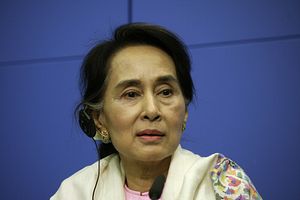Last week, Myanmar announced the first Cabinet proposed by its NLD-dominated government. Although a handful of important ministries, like defense, were reserved for the armed forces, the NLD took most of the other important posts. In fact, Suu Kyi herself decided to take four ministerial posts, including the foreign ministry.
As is common in any country transitioning to democracy, the list of Cabinet members was a mixed bag—some clearly qualified politicians and experts with deep knowledge in their ministry’s areas combined with party loyalists with dubious qualifications. Certainly, several jobs went to highly qualified people. The proposed new Minister of Hotels and Tourism, for instance, will be Ohn Maung, a hotelier with some four decades of experience in the travel industry. His Inle Princess Resort has been recognized as one of the best-run and most socially responsible hotels in Myanmar. Nai Thet Lwin, the proposed new Ethnic Affairs minister, is a longtime leader of the Mon National Party and is well respected by many ethnic parties.
However, the fact that Suu Kyi is taking four ministerial posts herself adds further weight to the idea that she intends to rule the NLD and the government—and thus Myanmar, even though she is constitutionally prohibited from taking the presidency. As a I noted in a previous post, it is too soon to determine whether new president Htin Kyaw will be a Suu Kyi puppet, as Suu Kyi clearly intends. Still, by amassing so much power within the Cabinet, Suu Kyi will have an even stronger hand to control the president and the party.
The second critical takeaway from the list of proposed ministers is that the NLD does not seem to have effectively vetted many of its Cabinet picks. Perhaps this lack of vetting is unsurprising; the NLD is putting together its first cabinet in a country that last had a democratic government five decades ago. But the lack of vetting is troubling, especially for those who worry that the NLD’s inexperience in governing will hinder its ability to run the country in these critical next two or three years.
According to reports in the New York Times and some Myanmar media, Kyaw Win, the proposed new finance minister, received his master’s degree and a doctorate from a “university” based in Pakistan that was actually a group of websites that provided fake diplomas. (Late last week, Kyaw Win admitted to local reporters that his degree in finance was indeed fake, although he still seems to be the leading contender for the ministerial post.) It seems likely that Kyaw Win was chosen for the job not for his credentials but because he had been a longtime NLD member and a trusted member of the NLD’s economic committee. His selection casts more doubt over the NLD’s direction on economic policy. Meanwhile, the man expected to be minister of commerce, Than Myint, has a degree from what the New York Times called an unaccredited correspondence school.
Businesspeople in Myanmar cannot be reassured by fact that the NLD chose these men for Cabinet positions in areas as important as finance and commerce. The picks should give pause, in fact, to anyone following Myanmar’s bumpy transition.
Joshua Kurlantzick is a fellow for Southeast Asia at the Council on Foreign Relations. This post appears courtesy of CFR.org.

































